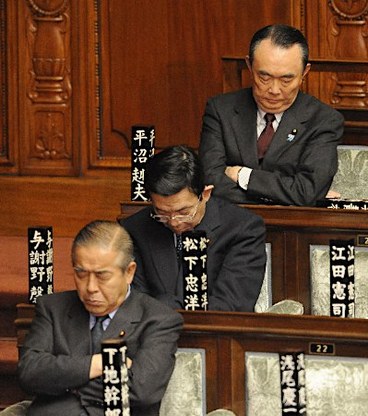A year ago, I was given the chance to publish an article on the March 11 2011 Japan Earthquake. I'm reposting the article for the people who lost their lives, people who have lost loved-ones and people who had the courage to move-on.
Reference: http://www.tokyomorningstar.com/in-remembrance-of-march-11/
 There was a great tsunami that caused nuclear meltdowns. Thousands of people died, became missing and lost their properties. The earthquake that shocked the world with its tremendous damage is also the same quake that paved the way for me to be in Japan. Hundreds of ALT’s flee Japan after this quake leaving a large need for teachers. I heard that a lot of Americans and British were not too happy to work here. Because of that, Japan opened its doors to Filipino English teachers. I was one of the first batches of these teachers. The grueling process of application and paperwork took me a year to finally come to Japan in June 2012.
As great and dark the shadow of the March 11 Earthquake is, I am one of its tiniest light. I was given higher odds to get a job here. I am not saying I am thankful that it happened; just that I am thankful I am here. As I build a better life here, I pray that victims of the March 11 Earthquake will soon have a better life too.
There was a great tsunami that caused nuclear meltdowns. Thousands of people died, became missing and lost their properties. The earthquake that shocked the world with its tremendous damage is also the same quake that paved the way for me to be in Japan. Hundreds of ALT’s flee Japan after this quake leaving a large need for teachers. I heard that a lot of Americans and British were not too happy to work here. Because of that, Japan opened its doors to Filipino English teachers. I was one of the first batches of these teachers. The grueling process of application and paperwork took me a year to finally come to Japan in June 2012.
As great and dark the shadow of the March 11 Earthquake is, I am one of its tiniest light. I was given higher odds to get a job here. I am not saying I am thankful that it happened; just that I am thankful I am here. As I build a better life here, I pray that victims of the March 11 Earthquake will soon have a better life too.
Reference: http://www.tokyomorningstar.com/in-remembrance-of-march-11/
In Remembrance of March 11
Written By Faye Vitan
 There was a great tsunami that caused nuclear meltdowns. Thousands of people died, became missing and lost their properties. The earthquake that shocked the world with its tremendous damage is also the same quake that paved the way for me to be in Japan. Hundreds of ALT’s flee Japan after this quake leaving a large need for teachers. I heard that a lot of Americans and British were not too happy to work here. Because of that, Japan opened its doors to Filipino English teachers. I was one of the first batches of these teachers. The grueling process of application and paperwork took me a year to finally come to Japan in June 2012.
There was a great tsunami that caused nuclear meltdowns. Thousands of people died, became missing and lost their properties. The earthquake that shocked the world with its tremendous damage is also the same quake that paved the way for me to be in Japan. Hundreds of ALT’s flee Japan after this quake leaving a large need for teachers. I heard that a lot of Americans and British were not too happy to work here. Because of that, Japan opened its doors to Filipino English teachers. I was one of the first batches of these teachers. The grueling process of application and paperwork took me a year to finally come to Japan in June 2012.
Maybe it wasn’t a coincidence that my first teaching assignment was in Iwate in the Tohoku region. It is one of the most affected places of the March 11 earthquake. I was expecting washed out lands and tin houses as I saw in the news. I was half-prepared for sad and devastated people. But when I arrived there, it was so much better than I expected.
Most of the area that I’ve been to in Iwate showed works-in-progress. Sure there were places that would need a lot of work but I am amazed how Japan was able to recover so quickly. This is especially true when I compared it with how my country, the Philippines, is taking decades just to eradicate the slums area. I was impressed with Japan’s determination to rebuild just a year after the earthquake when in my country it takes painstakingly long years just to recover from a flood. A flood’s devastation seems to be nothing compared to an earthquake, a tsunami and an ongoing nuclear meltdown.
I told one of my Filipino friends about this and she defended the Philippines saying that our country is poor. Before coming to Japan, I thought the same thing. Now, I don’t think that the Philippines is poor. We are poor because we think that way. We think we need the help of other countries to be progressive. We think we need aid for every disaster that happens every year. We think we have so little compared to Japan when in reality Japan and the Philippines are in the same region where earthquakes, typhoons, floods and volcanic eruptions can happen anytime.
I think there is more to why Japan rebuilds so quickly. I know a lot of countries came to their aid, sent help and prayed for their recovery. The Philippines also experienced those during Ondoy, during the flashfloods in the South, even as far back as during the Pinatubo eruption. There is just something more in Japan that I believe the Philippines should learn from. I don’t know what they are but I can point out one- the people.
When I arrived in Iwate, I wasn’t really expecting much from the people there. They lost a lot while I gained something with it. To expect more seems to be rather selfish of me. So I admire them even more when I saw how they accepted the things that happened, how they try move on and support each other in the process.
In one of the high schools I worked in, a lot of students lost their parents. Within a month, they were placed in homes where they can be taken care of. Schools and work resumed. All of the schools I’ve been to acknowledged the disaster and placed an area in remembrance of it. Students posted messages and words of encouragement. Areas who were not so much affected gave immediate aid to those who were in need. Various prefectures in Japan, until now, provide financial support to those who would like to transfer to another place. The Filipinos are also like these-to some degree. But what I think we fail to understand as Filipinos is that rebuilding lives is a process with tons of hard work. The Japanese just don’t quickly help then forget about it. They remember it acknowledging that a lot of work must be put into it. I hope the Filipinos would also care as much and help as much. I hope Filipinos understand that rebuilding, recovery and, ultimately, progress is a process not undertaken by a few concerned individual but as a nation. It might sound cliché but I have seen how this collective effort worked. No matter how great the March 11 earthquake was, the unity of the Japanese is even greater.




